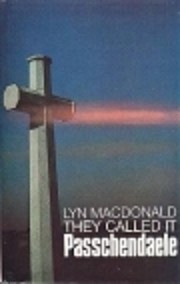

Pulse en una miniatura para ir a Google Books.
|
Cargando... They Called it Passchendaele (1978)por Lyn Macdonald
 Ninguno Actualmente no hay Conversaciones sobre este libro. Mooi boek over één van de bloedigste veldslagen uit de geschiedenis. MacDonald laat het verloop van de strijd samenvallen met getuigenissen van de strijders. Wie de documentaire op canvas zag over de laatste getuigen, weet wat ik bedoel met inleefvermogen. Gelezen in vertaling. Je fietst wel even anders door het landschap van Passendale. 1947. They Called It Passchendaele: The Story of the Third Battle of Ypres and of the Men Who Fought In It, by Lyn MacDonald (read 10 Oct 1985) This book is about half comments by men who were at the battle--there is at least one consolation: the men quoted survived. Really horrible. and more revelatory of what it was like than some other accounts. sin reseñas | añadir una reseña
The Classic Account of Passchendaele - Reissued for the First World War Centenary The third battle of Ypres, culminating in a desperate struggle for the ridge and little village of Passchendaele, was one of the most appalling campaigns in the First World War. A million Tommies, Canadians and Anzacs assembled at the Ypres Salient in the summer of 1917, mostly raw young troops keen to do their bit for King and Country. Lyn Macdonald's Passchendaeletells their tale of mounting disillusion amid mud, terror and desperate privation, yet it is also a story of immense courage, comradeship, songs, high spirits and bawdy humour. Passchendaeleportrays the human realities behind one of the most disastrous events in the history of warfare. 'It is rare to find a history of the First World War which manages to convey the front-line soldiers' experiences and to describe what it was that enabled those who survived to get through it. Lyn Macdonald has done just that' Sunday Times Over the past twenty years Lyn Macdonald has established a popular reputation as an author and historian of the First World War. Her books are based on the accounts of eyewitnesses and survivors, told in their own words, and cast a unique light on the First World War. Most are published by Penguin. No se han encontrado descripciones de biblioteca. |
Debates activosNingunoCubiertas populares
 Google Books — Cargando... Google Books — Cargando...GénerosSistema Decimal Melvil (DDC)940.4History and Geography Europe Europe Military History Of World War IClasificación de la Biblioteca del CongresoValoraciónPromedio: (3.91) (3.91)
¿Eres tú?Conviértete en un Autor de LibraryThing. |
||||||||||||||||||||||||||||||||||||||||||||||||||||||||||||||||||||||||||||||||||||||||||||||||||||||||||||||||||||||||
It concentrates on the experiences of the common soldiers and those actually at the front line, rather than the upper ranks. It highlights the utter futility of the episode. At the start of the book, in 1915, a senior officer suggests falling back to a set of positions that were better sited. His idea was dismissed and he forced to resign for making the suggestion. The forces were pushed forward into attack to gain the higher ground ahead of them. After 2 years of horendous casualties, they had advanced about 5 miles. At the end of the book, in 1918, the line was pulled back to almost exactly the positions suggested in 1915. There were sucesses, the mines to capture the ridge at Messines were (until recently) to largest explosions ever, but the sucesses were outweighed by the immense difficulty in holding the ground captured. One wood seems to have changed hands multiple times, each time the men had to advance over the broken ground and dead bodies of the previous attacks.
It is sad now to consider that (most probably) all of the contributors to this book have died, there is no one left who was there. This book is all that is left of their collective reccolections.
It isn't necessarily an enjoyable read; but it was well composed, full of sparks of light in the all pervading gloom and engrossing. (